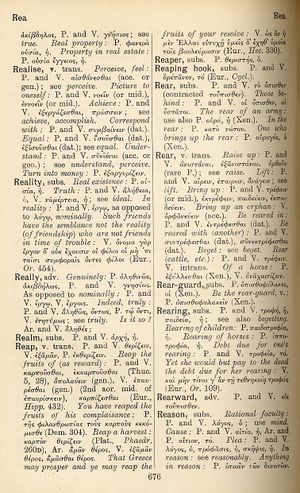reason: Difference between revisions
Βέβαιον οὐδέν ἐστιν ἐν θνητῷ βίῳ → Nihil, ut videtur, proprium in vita datur → Nichts Festes gibt's im Leben eines Sterblichen
m (Woodhouse1 replacement) |
mNo edit summary |
||
| Line 13: | Line 13: | ||
[[anything in reason]]: [[prose|P.]] [[ὁτιοῦν τῶν δυνατῶν]]. | [[anything in reason]]: [[prose|P.]] [[ὁτιοῦν τῶν δυνατῶν]]. | ||
[[it stands to reason]]: [[prose|P.]] and [[verse|V.]] [[εἰκός]] ([[ἐστι]]), [[ | [[it stands to reason]]: [[prose|P.]] and [[verse|V.]] [[εἰκός]] ([[ἐστι]]), [[εὔλογον]] ([[ἐστι]]). | ||
[[by reason of]]: [[prose|P.]] and [[verse|V.]] [[διά]] (acc.), [[ἕνεκα]] (gen.), [[χάριν]] (gen.) ([[Plato]]), [[verse|V.]] [[εἵνεκα]] (gen.), [[Aristophanes|Ar.]] and [[verse|V.]] [[ἕκατι]] (gen.), [[οὕνεκα]] (gen.), sometimes in [[prose|P.]] [[παρά]] (acc.) ([[Demosthenes|Dem.]] 545). | [[by reason of]]: [[prose|P.]] and [[verse|V.]] [[διά]] (acc.), [[ἕνεκα]] (gen.), [[χάριν]] (gen.) ([[Plato]]), [[verse|V.]] [[εἵνεκα]] (gen.), [[Aristophanes|Ar.]] and [[verse|V.]] [[ἕκατι]] (gen.), [[οὕνεκα]] (gen.), sometimes in [[prose|P.]] [[παρά]] (acc.) ([[Demosthenes|Dem.]] 545). | ||
Revision as of 11:12, 7 June 2020
English > Greek (Woodhouse)
substantive
rational faculty: P. and V. λόγος, ὁ; use mind.
cause: P. and V. αἰτία, ἡ, Ar. and P. αἴτιον, τό.
plea: P. and V. λόγος, ὁ, πρόφασις, ἡ, σκῆψις, ἡ.
in reason: see reasonably.
anything in reason: P. ὁτιοῦν τῶν δυνατῶν.
it stands to reason: P. and V. εἰκός (ἐστι), εὔλογον (ἐστι).
by reason of: P. and V. διά (acc.), ἕνεκα (gen.), χάριν (gen.) (Plato), V. εἵνεκα (gen.), Ar. and V. ἕκατι (gen.), οὕνεκα (gen.), sometimes in P. παρά (acc.) (Dem. 545).
for what reason? P. and V. διὰ τί; τοῦ χάριν; V. ἐκ τίνος λόγου; see why.
for no reason: V. ἐξ οὐδένος λόγου.
for other reasons: P. and V. ἄλλως.
for many reasons we may expect victory: P. κατὰ πολλὰ εἰκὸς ἐπικρατῆσαι (Thuc.).
verb intransitive
P. and V. λογίζεσθαι, P. συλλογίζεσθαι.
reason rightly: P. and V. ὀρθῶς γιγνώσκειν.

